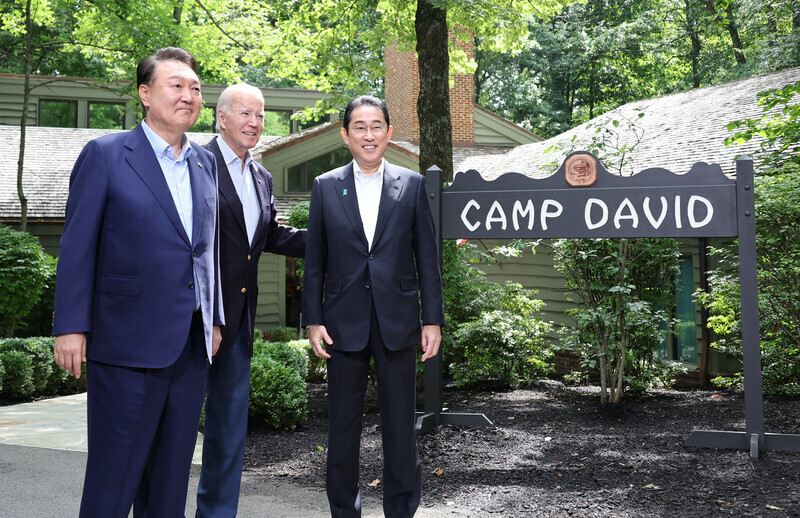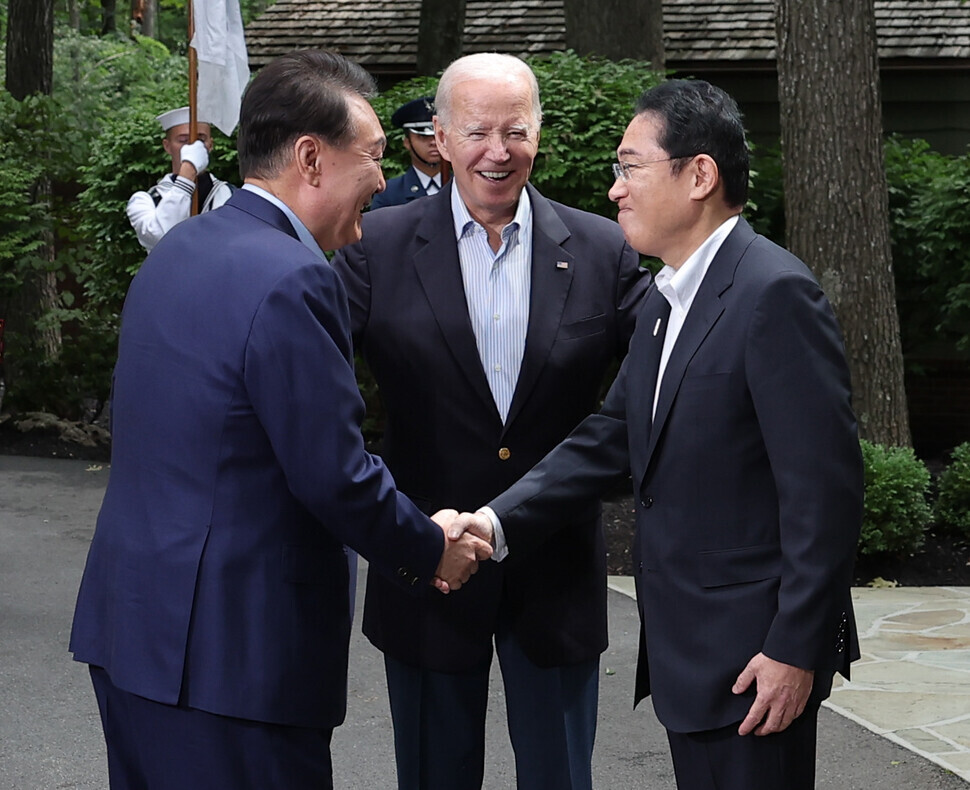hankyoreh
Links to other country sites 다른 나라 사이트 링크
S. Korea-US-Japan commitment to consult on “threats” outlines alliance-like structure

South Korean President Yoon Suk-yeol, US President Joe Biden, and Japanese Prime Minister Fumio Kishida met for a trilateral summit at Camp David on Friday, where they announced a “commitment to consult” among their three countries.
The commitment states that the three countries will share information, align messaging, and coordinate response actions to regional challenges, provocations, and threats.
This is being interpreted as a de facto framework for security cooperation tantamount to an alliance, in that the three countries can take immediate joint action in the event of a threat to South Korea, the US or Japan.
The three countries also formalized the launch of an annual trilateral Indo-Pacific dialogue, which is aimed squarely at countering North Korea and China.
“To make sure that each of our freedoms is neither threatened or damaged, our three nations must tighten our solidarity,” Yoon said in his opening remarks at the summit. “Such is also our promise and mandate towards our future generations. The stronger coordination between Korea, the US, and Japan requires more robust institutional foundations.”
The summit took place at Camp David, the US president’s retreat in Maryland.
Yoon also emphasized that the summit would be “remembered as a historic day where we established a firm institutional basis and commitments to the trilateral partnership.”
Biden echoed this sentiment, saying that the cooperation between the three countries will help “serve as a force of good across the Indo-Pacific and, quite frankly, around the world as well.”
Kishida added to such sentiments by saying Japan would “take this moment to raise the security — the coordination between Japan, ROK, and the US to new heights while strengthening the coordination between the Japan-US and the US-ROK alliances.”
ROK stands for Republic of Korea, South Korea’s official name.

The three leaders held a joint press conference after their meeting to announce the adoption of three documents: “The Spirit of Camp David,” a joint statement by the US, Japan, and South Korea that encompasses comprehensive cooperation measures among the three countries, including the regularization of summit meetings; the “Camp David Principles,” which document the principles of the trilateral cooperation process; and the “Commitment to Consult,” which expresses the political will to promptly consult and coordinate measures to respond to common threats.
Among other things, the “commitment to consult” states that the leaders of the three countries “commit [their] governments to consult trilaterally with each other, in an expeditious manner, to coordinate our responses to regional challenges, provocations, and threats affecting our collective interests and security.”
A pledge of the political will at the highest level to strengthen trilateral consultations, the commitment will likely be realized through sharing information and coordinating messaging and countermeasures among the three countries.
Kim Tae-hyo, the first deputy director of Korea’s National Security Office, held a briefing at the press center in Washington, DC, on Thursday night, prior to the joint press conference, to explain the document.
“It’s a stand-alone document containing a political commitment to strengthening trilateral consultations,” Kim said, explaining that it “will enable the countries to closely communicate and prepare timely and effective responses to common threats and challenges in the region.”
While the document does not specify what exactly constitutes the “threats” mentioned, South Korea’s presidential office said they include “threats from within and outside the region, including military security, economic and trade, and cyber threats.”
The pledge is a basis for the three countries to engage in practical cooperation via a joint security framework in the event of a North Korean nuclear or missile threat, a major maritime provocation, China’s “unilateral attempts to change the status quo by force,” or trade disruptions in the region or elsewhere.
“There are no ‘duties’ as such,” said a senior presidential office official. “The pledge does not impose any new international legal obligations.”
The same official went on to add that “when all three countries agree that there is a national security crisis, they immediately commence sharing information and coordinating their messages.”
The pledge is likely to be viewed as a steppingstone to a trilateral collective security system — effectively a quasi-alliance.
In addition, the leaders demonstrated their determination to continue the trilateral cooperation between their three countries even beyond their respective terms of office by institutionalizing the arrangement with annual meetings of the leaders, national security chiefs, and ministers of foreign affairs, defense, and industry at all levels and in each field.
Yoon, Kishida and Biden furthermore moved to bolster practical pressure measures against North Korea, such as establishing and operating a real-time information-sharing system for North Korean missile warnings before the end of the year and regularizing trilateral defense drills.
The three countries also launched trilateral dialogues for the Indo-Pacific and development policy to augment their influence in the Association of Southeast Asian Nations (ASEAN) and Pacific Island nations, demonstrating that South Korea and Japan will support Washington’s Indo-Pacific strategy.
The three countries also pledged to cooperate in supporting and rebuilding Ukraine, enforcing sanctions against Russia, and reducing energy dependence on Russia.
Yoon’s office sees the summit as having completed the “core framework” for trilateral cooperation.
“As can be seen in the joint statement, the summit ushered in a new era of trilateral partnership,” Kim stated, adding that “the trilateral cooperation will evolve into the most comprehensive and multilayered cooperation in the region.”
He went on to state that together with AUKUS (US-UK-Australia alliance) and Quad (US-Japan-Australia-India strategic security dialogue), this framework will function as “a powerful partnership to promote peace and prosperity at home and abroad.”
“Going forward, the cooperation among the US, Japan and South Korea will serve as an opportunity for the three countries to play a pivotal role in pursuing freedom, peace and prosperity in the Indo-Pacific region,” the deputy director said.
However, the meeting is likely to fuel tensions in the region as the US-led encirclement of North Korea, China and Russia tightens. This is because, amid the continued hegemonic rivalry between the US and Washington, another check on China has been built right underneath Beijing’s nose, adding to AUKUS and the Quad.
The outcome of the summit strongly reflects US interests, such as peace in the Indo-Pacific region, raising questions as to whether South Korea’s own national interests were served.
“The structures of the national interests of South Korea, the US, and Japan are all different,” Kim Jung-sup, the vice president of the Sejong Institute, told the Hankyoreh. “The problem is that instead of attuning our differences in national interests, we’ve matched ours to be one and the same with those of the US.”
This is the first time the leaders of the three countries have gathered for a stand-alone meeting outside of the context of a multilateral conference.
The three leaders also highlighted the summit as an occasion for bonding among the heads of state, taking a walk through Camp David and eating lunch together. Korea’s presidential office emphasized that this was the most amount of time that the leaders had spent together, and that they held in-depth discussions.
Yoon also used the trilateral summit as an opportunity to hold back-to-back bilateral meetings with the US and Japan to discuss security, economic and cultural cooperation between the countries.
By Kim Mi-na, staff reporter
Please direct questions or comments to [english@hani.co.kr]

Editorial・opinion
![[Column] Tariffs on China: Trump was dumb, Biden dumber [Column] Tariffs on China: Trump was dumb, Biden dumber](https://flexible.img.hani.co.kr/flexible/normal/500/300/imgdb/original/2024/0520/191716191153918.jpg) [Column] Tariffs on China: Trump was dumb, Biden dumber
[Column] Tariffs on China: Trump was dumb, Biden dumber![[Column] What if Seoul took reunification by force off the table? [Column] What if Seoul took reunification by force off the table?](https://flexible.img.hani.co.kr/flexible/normal/500/300/imgdb/original/2024/0520/3017161928630494.jpg) [Column] What if Seoul took reunification by force off the table?
[Column] What if Seoul took reunification by force off the table?- [Editorial] Intensifying US-China rivalry means Seoul must address uncertainty with Beijing sooner than later
- [Column] When ‘fairness’ means hate and violence
- [Editorial] Yoon must stop abusing authority to shield himself from investigation
- [Column] US troop withdrawal from Korea could be the Acheson Line all over
- [Column] How to win back readers who’ve turned to YouTube for news
- [Column] Welcome to the president’s pity party
- [Editorial] Korea must respond firmly to Japan’s attempt to usurp Line
- [Editorial] Transfers of prosecutors investigating Korea’s first lady send chilling message
Most viewed articles
- 1Xi, Putin ‘oppose acts of military intimidation’ against N. Korea by US in joint statement
- 2Kim Jong-un wanted to meet with residents of shelled Yeonpyeong Island in South, Moon recalls in mem
- 3Berlin mayor hints at tearing down ‘comfort women’ memorial in city
- 4[Column] What if Seoul took reunification by force off the table?
- 5To weigh costs and benefits, Korea must stop treating US troop presence as a sacred cow
- 6For new generation of Chinese artists, discontent is disobedience
- 7[Column] Tariffs on China: Trump was dumb, Biden dumber
- 8China, Russia put foot down on US moves in Asia, ratchet up solidarity with N. Korea
- 9Putin’s trip to China comes amid 63% increase in bilateral trade under US-led sanctions
- 10[Exclusive] Unearthed memo suggests Gwangju Uprising missing may have been cremated